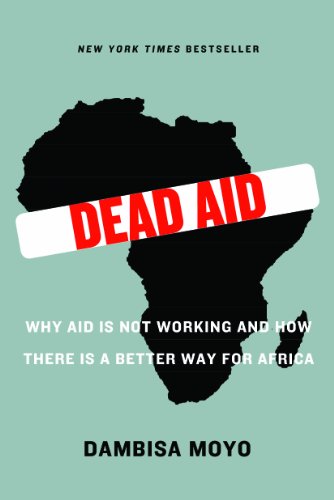Dead Aid: Why aid is not working and how there Is a better way for Africa
by Dambisa Moyo
(Farrar, Straus and Giroux, 2009, 2008 pages)
 The road to hell is said to be paved with good intentions. And the way in which the post-colonial West has satisfied its sensitivities toward the third world through foreign aid is no better demonstration of this proverb.
The road to hell is said to be paved with good intentions. And the way in which the post-colonial West has satisfied its sensitivities toward the third world through foreign aid is no better demonstration of this proverb.
Economic growth of those countries most dependent on foreign aid has remained stagnant, and in some cases, has regressed. What has perhaps emerged is one of the most egregious and iconic failures of Western humanitarianism. Yet foreign aid attracts a consistently popular following.
In Dead Aid, Dambisa Moyo, an economist from Zambia, details this failed approach to African development, arguing that it is a morally cloaked crusade that has not only proven itself ineffective, but malignant to African growth. The author's central thesis is clear -- given the patent failure of a trillion dollars in assistance, now is as good a time as any to rapidly scale back aid while promoting effective pro-market policies.
Moyo's objections to aid are two-fold. Aid arrests economic growth by undermining the operation of emerging markets. Constant streams of large sums of money mean nations unsurprisingly feel no compulsion to foster sustainable market growth. At worst, aid projects have even replaced profitable and growing industries, like that of mosquito nets across the region. The result is a culture of aid dependency, in which big and inefficient programs persistently hinder opportunities for individual economic pursuit.
Moyo also argues that aid fosters, even facilitates corruption. Massive transfers of aid so susceptible to theft have created a vicious cycle in which many rulers actively promote continued dependency. Rampant corruption has become almost characteristic of Africa's long road out of poverty.
Given the lessons of history, Dead Aid's free market prescriptions are unsurprising. Moyo herself recognises that ''no economic ideology other than one rooted in the movement of capital and competition has succeeded in getting the most people out of poverty, in the fastest time.'' Unfortunately, the free market lacks the crucial altruistic shine which attracts the loudest, most influential aid advocates. Nonetheless Moyo makes a well-reasoned and compassionate case for a departure from the decrepit aid model.
The book endorses policy instruments like encouraging African governments to raise bonds in global capital markets, nurturing foreign direct investment (essentially Chinese investment in infrastructure), establishing the same micro-credit schemes that exist in Asia, and establishing truly free trade -- a task for Africa and the developed world alike.
None of this is new. The problem that remains, and one to which Moyo dedicates only cursory attention, is addressing the political challenges involved with compelling the most autocratic of states to relinquish significant powers to market forces.
Though Dead Aid does not profess to be a meticulous academic study of development economics, it makes an important subject matter more widely digestible. Nor does it necessarily provide a fresh case to reconsider aid, however Moyo certainly joins fellow economists like Jagdish Bhagwati and William Easterly as articulate and accessible authorities on the issue.
Current thinking on global development often falls into the trap of looking upon Africa as an exception to the rule. Whereas free markets have ushered in prosperity and growth elsewhere, Africa's lag is seen to demonstrate the need for a separate set of policies. Nothing could be further from the truth. Dead Aid clarifies the impulse behind such thinking:
Western donors have an industry to feed, farmers to placate (vulnerable when trade barriers are removed), liberal constituencies with ''altruistic'' intentions to allay, and, facing their own economic challenges, very little time to worry about Africa's demise.
Aid may be easy and it may be gratifying, but its virtues end there. Economic liberalisation has proven the most successful path to development. Even if it lacks the moral simplicity of aid, pro-growth alternatives are the most powerful force of good for Africa.
No comments:
Post a Comment